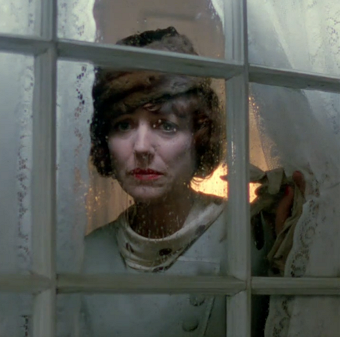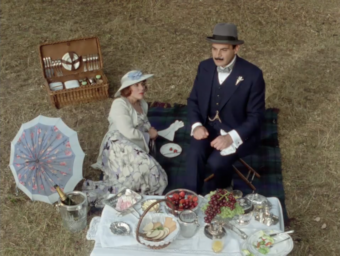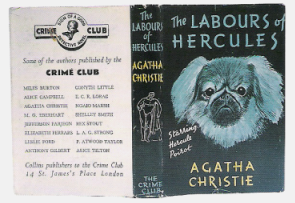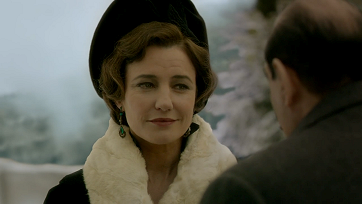Countess Vera Rossakoff

The Countess appears to be in a pensive and melancholy mood in a scene from "The Double Clue" (1991). She was played in this adaptation by actress Kika Markham.
Like Poirot, the Countess Vera Rossakoff was a refugee. She claimed she was of Russian nobility, but that claim was never verified. She was the only woman to get the attention of Poirot: he had affection and admiration for her. Despite appearing in only three stories, she still left quite an impression upon the Belgian detective.
They met for the first time during a jewel robbery. That short story is "The Double Clue", found in the short story collections Poirot's Early Cases (UK) and Double Sin and Other Stories (US). She was described as a "very charming Russian lady, a member of the old regime". Poirot scoffed at this assessment of the Countess, saying: "Any woman can call herself a Russian countess". Captain Hastings describes the introduction of the Countess in "The Double Clue" as such: "Without the least warning the door flew open, and a whirlwind in human form invaded our privacy, bringing with her a swirl of sables (it was as cold as only an English June day can be) and a hat rampant with slaughtered ospreys. Countess Vera Rossakoff was a somewhat disturbing personality."
In the story, Rossakoff solicits Poirot's help in clearing the innocence of a young man (assistant to a jewel collector). Through the investigation, Poirot's opinion of the Countess changes. He comments with admiration: "What a woman! Mon Dieu, quelle femme! Not a word of argument--of protestation, of bluff! . . . I tell you, Hastings, a woman who can accept defeat like that--with a careless smile--will go far!"At the end of solving the case, Poirot says to the Countess that he hopes to meet her again; she says she hopes not. She says to him: "It is a great compliment that I pay you there--there are very few men in the world whom I fear."
Poirot next encounters the Countess a few years later in The Big Four. Going by the name of Inez Veroneau, her identity was that of secretary of a famous French chemist, a Madame Olivier. When Rossakoff encounters Poirot and Hastings again, she expresses her dismay: "As soon as I caught sight of you in the hall, I feared the worst." She feared that because of the Belgian detective, she would lose her position as secretary. Shortly after, Poirot reveals to Olivier that indeed the Countess is a master thief and is the likely person responsible for the theft of Olivier's research into the chemical element radium. Poirot surmises that the Countess is in fact an agent of the criminal organization the Big Four.

The Countess and Poirot share a few moments together, such as this picnic. Such scenes have been added to the televised adaptation of the short story "The Double Clue".
Some time after her disappearance, the Countess finds Captain Hastings. She asks him, for his safety, to return to South America because the Big Four requests it. She says to Hastings, "Do not try to have me arrested either, for that would be stupid. You were always a little stupid--yes, yes, it is so. You are stupid now, when you persist in disregarding the warning we sent you." After that enounter, Hastings says this about Countess Rossakoff, "Poirot, for some reason or other, had always had a sneaking fondness for the countess. Something in her very flamboyance attracted the little man. She was, he was wont to declare in moments of enthusiasm, a woman in a thousand."
Poirot and Hastings were eventually kidnapped and brought to the secret headquarters of the Big Four. The Countess, present there, was introduced as the Big Four's "valued and trusted lieutenant." She was again dismayed to see Poirot, saying to him: "Oh, little man, little man! Why did you mix yourself up in this?" At Poirot's first opportunity, he appealed to her by asking: "Madame, you can aid us to escape. You know the secret ways out of this retreat. I ask you, what is your price?" In exchange of reuniting the Countess with her son, having presumed him dead, she led Poirot and Hastings to safety. Hastings was surprised she had a son. Poirot explained that he had researched her family and found that she had child who was reported killed. Poirot had found the Countess' son and saved him from starvation. Poirot said he was prepared to play his trump card (presenting to the Countess her lost son) but he was also genuinely happy to do it (again speaking of his admiration for the Countess).

The first UK jacket for The Labors of Hercules (1947) featured the head of a Pekingese.
Poirot had not seen the Countess until twenty years later, in the London tube station at Piccadilly Circus. This meeting is recounted in the short story "The Capture of Cerberus", collected with the other short stories that comprise The Labors of Hercules. Descending on the escalator into the station, opposite direction of Poirot, was the Countess. She was described as "a woman of full and flamboyant form; her luxuriant henna red hair crowned with a smal plastron of straw to which was attached a positive platoon of brilliantly feathered little birds. Exotic-looking furs dripped from her shoulders." Upon asking her where to find her, she responded simply and mysteriously: "In Hell". Poirot immediately went down again into the station and rode the train to a few platforms looking for her. Unfortunately, he didn't find her.
Undeterred, Poirot asks his secretary Miss Lemon about "Hell". With her help, he finds out that it is a new night club--"very much the rage at present". Determined to see Countess Rossakoff, he goes to the club that evening. The short story explains Poirot's determination like this: "It is the misfortune of small precise men to hanker after large and flamboyant women. Poirot had never been able to rid himself of the fatal fascination the Countess held for him". Poirot is reaquainted with the Countess that night, wearing a dazzling scarlet evening dress. Poirot finds out that the Countess' son is an engineer in the United States, that he's engaged to a psychologist named Alice Cunningham, and that the Countess runs the night club Hell. He also discovers that there is a drug racket going on in the night club.

Rossakoff was played by Irish actress Orla Brady in the TV adaptation of The Labors of Hercules (2013). It combined a few of the short stories into one episode, including "The Capture of Cerberus". In the adaptation, the Countess does not have a son; her daughter is the psychologist from the short story.
When asked by Poirot if the Countess knows that criminals are to be found at her club, she responds to him (while laughing): "There speaks the bon bourgeois! Naturally I realize! Do you not see that that is half the attraction of this place?" She even tells Poirot that she knows an inspector from Scotland Yard investigates the club Hell in disguise. However, she tells Poirot that she had no idea that drugs are dealt in her club. Poirot reveals the true culprit behind the drug ring, locates the hidden merchandise, and frees the Countess from being the scapegoat. A week later, Poirot sends to the Countess red roses to congratulate her on the engagement of her son to the daughter of his employer. Justifying the expense to his secretary Miss Lemon, Poirot started to blush. Unfortunately for the readers of Agatha Christie, this is the last time Hercule Poirot sees Vera Rossakoff.